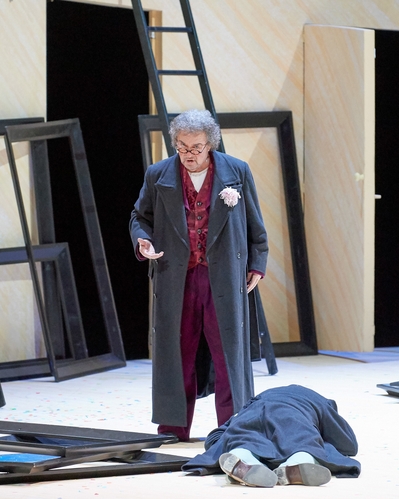On the death of Franz Grundheber
The House |
The Staatsoper family is deeply saddened by the death of its honorary member KS Franz Grundheber, who passed away on September 27, 2025, exactly on his 88th birthday.
The celebrated baritone was born in Germany and made guest appearances in Brussels, Paris, London, Madrid, Milan, San Francisco, New York and at the Salzburg Festival during the course of his international career.
He made his debut at the Haus am Ring in 1976 as Nozze-Figaro and finally made his breakthrough as a celebrated Viennese audience favorite with Wozzeck in a new production in 1987.
And from then on, it was impossible to imagine the State Opera stage without him. It was not without reason that Vienna became an additional home for Grundheber.
His circle of friends or enthusiastic followers (the boundary between the two groups was fluid) grew steadily. This was also reflected in the steadily growing number of people who not only waited at the stage door for Grundheber to appear. After the performances, many even overcame the barrier of the stage door and stormed the soloist's dressing room.
The fact that his love was mutual, that this house and this audience were particularly close to his heart, was evident not least in his deep sadness when he bid farewell to the Vienna State Opera in 2017 as Schigolch in Berg's Lulu after more than 40 years at the end of his career.
KS Franz Grundheber appeared on this stage almost 260 times, in an incredibly broad repertoire that encompassed German, Italian and French roles in equal measure.
Remarkable in this context was how he refuted the often-heard cliché that German singers could not perform Italian roles optimally. His interpretations of Rigoletto made performance history. Grundheber suffered and struggled so intensely on stage as the court jester that listeners were shaken to the core for days afterwards. His desperate and vengeful "Sì, vendetta, tremenda vendetta" will remain in the memory of anyone who ever had the chance to witness it.
In general, it was very often the broken characters that he was able to shape vocally and as an actor in an inimitable way.
The way he sang Amfortas' "Erbarmen! Thou Most Merciful! Oh, mercy!" or the "Out with your weapons! Dip your swords deep, to the hilt!". These shouts were directed at his Knighthood of the Grail - but above all at the spellbound audience. It was a deeply stirring experience every time.
Of course, he sang all the great characters of his fach - such as Amonasro, Holländer, Jago, Orest, the villains in Contes d'Hoffmann, Scarpia, Cardillac, Dr. Schön, but he also knew how to convince in rarities, for example as Guglielmo Wulf in Puccini's debut Le villi, sang Moses with great dedication in a new production of Schönberg's opus or Carlo Borromeo in Pfitzner's Palestrina.
As varied as the roles Franz Grundheber sang at the Vienna State Opera were, all his interpretations were similar in one respect: Grundheber lived his characters, every note he sang, every gesture he made became a deep psychological drilling. He literally descended into the most hidden regions of a character in order to be able to authenticate all their feelings and thoughts from within
